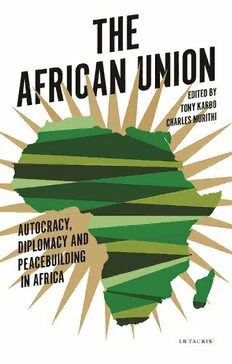
The African Union: Autocracy, Diplomacy and Peacebuilding in Africa PDF
351 Pages·2018·3.619 MB·English
Most books are stored in the elastic cloud where traffic is expensive. For this reason, we have a limit on daily download.
Preview The African Union: Autocracy, Diplomacy and Peacebuilding in Africa
Description:
The African Union has been a major factor in establishing peace, security and development in Africa. Today, however, the intranational body is struggling in the midst of a perceived dissipating appetite for supporting continental institutions. Previously seen as the panacea to Africa's continuing problems with violence and corruption in society, under the slogan "African Solutions to African Problems", the African Union, this book argues, seems to have run its course.Recognizing that the measured successes in political emancipation which have been recorded across the African continent do not seem to have translated into economic and social gains for its 1.2 billion citizens, the AU adopted a new development framework dubbed "Agenda 2063". The framework calls on African leaders to rediscover the `Pan African' spirit and to create the `Africa Africans want'. In practice this means a new focus and engagement with the African Diaspora, tapping into their strong track-record in economic development. As this book shows however, there remain deep differences over the meaning, timing and sequencing of pan-African integration. Indeed, different member states have different understandings of the role of the African Union itself.This essential handbook, from one of the leading research institutions on the continent, seeks to uncover what some of those understandings are and why the unification project has remained so elusive.
See more
The list of books you might like
Most books are stored in the elastic cloud where traffic is expensive. For this reason, we have a limit on daily download.
